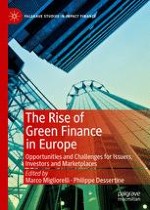2019 | OriginalPaper | Chapter
3. The Development of Green Finance by Sector
Authors : Olaf Weber, Amr ElAlfy
Published in: The Rise of Green Finance in Europe
Publisher: Springer International Publishing
Activate our intelligent search to find suitable subject content or patents.
Select sections of text to find matching patents with Artificial Intelligence. powered by
Select sections of text to find additional relevant content using AI-assisted search. powered by
